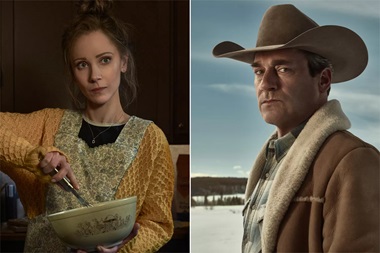
Juno Temple stars as Dorothy ‘Dot’ Lyon, and Jon Hamm plays North Dakota Sheriff Roy Tillman in ‘Fargo.’
The season five finale of Fargo packed a spiritual punch I was not expecting, with a dinner scene that invited everyone to a meal table that had overt eucharistic overtones and that invited everyone to take and eat and be forgiven, whatever sins they had committed (or eaten) on behalf of others previously.
More on the eating of sins later, but it is fair to say that Fargo throughout the whole of season five demonstrated the destructive force of Christianity gone astray and the life-giving force when grounded in God’s love and forgiveness.
If you do not know the world of Fargo, it exists in a mythical place somewhere between Minnesota and reality. This world was first explored in Joel and Ethan Coen’s film Fargo, a quirky blockbuster that won its star Frances McDormand an Academy Award for Best Actress in 1996 for her portrayal of Marge Gunderson.
Marge is a consistently kind and thoughtful police officer whose demeanour never changes as she tracks down the evildoers who drive the plot of the film, but it is always clear: evil will be tracked down and brought to justice, just after a good, hearty breakfast. Marge is diligent in her work, but never in a hurry, and her kindness, though taken sometimes by evildoers for stupidity, masks her attention to detail, to her integrity and to her unrelenting goodness.
The uniqueness of this movie and its characters and its setting in such a specific place and accent – you betcha’ – might not make it seem ripe for development into a TV series, but it turns out that battles of good and evil, even if grounded in a midwestern Minnesota accent, shine a light on our basic humanity that transcends location and dialect.
In fact, grounding a story in a precise place with mythic and ordinary characters, even if those characters change from season to season, makes it particularly suited for a show that is both different every season and somehow always the same. Season Five of Fargo is thus far the apex of the series and rivals the movie for its insight into the human condition, examining the perennial battle between good and evil in a distinct historical period and place.
It would take far too long to explore all of season five, or even all of the finale, but the distinct period and place is not just Minnesota and North Dakota this year, but present-day United States.
Geographically the story is rooted in Minnesota, but the series explores a number of right wing movements supposedly based in Christianity existing currently throughout the USA. For instance, Roy Tillman (Jon Hamm) represents the sovereign citizen and constitutional sheriff movements in the USA.
“The sovereign citizen movement is a large anti-government extremist movement whose adherents believe the government is the illegitimate product of a conspiracy that subverted the original, lawful government. They claim people can take steps to divorce themselves from the illegitimate government, after which it has no authority or jurisdiction over them” (https://www.adl.org/resources/backgrounder/sovereign-citizen-movement-united-states).
Often undergirding this position is the constitutional sheriff movement, which argues that the authority of the sheriff supersedes that of the federal government.
Roy Tillman is the sheriff of note in season five, who abuses and kills people and sees his wives as property who belong to him, even if they were only 15 years old when he married them, as was Dorothy ‘Dot’ Lyon. Roy is a type of fundamentalist Christian steeped in misogyny and patriarchy: his word is law and he has a right to do with his property whatever he chooses, including killing.
So, male headship and women’s submission is a part of Roy’s law, elements of which are found throughout American evangelicalism today. A good examination of this sort of biblical interpretation is found in Jill Hicks-Keeton’s The Good Book: How White Evangelicals Save the Bible to Save Themselves. Dorothy ran away from Roy to save herself from an unwanted marriage and from constant physical and mental abuse.
She remarried a kindly Minnesota man (Wayne Lyon), changing her name to Dorothy from Nadine, and together they have a lovely daughter Scotty. They are all kind and good and decent. Things go off the rails when Roy tracks his runaway wife Dorothy down and attempts to bring her back ‘home.’
The initial crew sent to kidnap her includes a man named Ole Munch. Ole Munch is an ancient man, who has lived for hundreds of years, unable to die it seems since centuries ago as the poorest of the poor he became a ‘sin-eater’ in order to survive, and he is now forced to wander the earth carrying the sins of others. He is caught up in a world of debt repayment that can never be made good.
The sin-eater was an actual role in England and Wales, although when it started is not clear.
“The ‘sinne-eater’ was a poor person hired to absorb the sins of recently deceased souls. Families wanted to spare their deceased members the discomfort of purgatory. The sin-eater would ceremoniously consume food prepared by the deceased’s family. This was often bread and ale.”
A popular YouTube channel, Tasting History, actually has an episode on “Sin-Eaters and Funeral Biscuits” that explores this tradition.
There is much more to examine; if you have seen the season, you do not need an overview, and if you have not, you need to see it to make sense of it all. Suffice it to say that after Dorothy was taken captive, abused and soon to be killed by Roy and his men, she escaped with the help of Ole Munch. Roy was taken down by government authorities with some help from Dorothy.
A year later, Dorothy is back home with her husband and daughter making chili and biscuits for dinner when Ole Munch is in their living room looking for a debt to be paid by Dorothy, the debt she owes since he helped to free her. Dorothy simply responds with kindness, asking Ole Munch to wash his hands and to help with making the biscuits. He seems confounded by all of it – the normalcy, the kindness, but just simply the grace of Dorothy’s welcome and that of her husband and daughter – who treat him as a welcome guest at the table.
Ultimately, he sits to eat with them and they recite together a common Catholic mealtime grace, “Bless us, O Lord, and these, thy gifts, which we are about to receive from Thy bounty, through Christ, our Lord,” a prayer that dates back at least to the Gelasian Sacramentary of the 7th or 8th century. Dorothy convinces Ole Munch that “you need to eat something made with joy and love. And be forgiven.” He takes and eats and his face beams with love, joy and forgiveness.
Forgiveness is so powerful throughout this last episode. The debts we owe each other can never be fully paid; it is only forgiveness that sets us free from what we have done and what others have done to us. In this scene, Dorothy and Ole Munch understand the Lord’s Prayer as a petition and as an action: “forgive us our debts, as we also have forgiven our debtors.”
Freedom comes through forgiveness, which can only be an act of joy. Dorothy models forgiveness elsewhere in this episode by hugging Roy’s son Gator and telling him she would make him cookies, though he has tormented and sinned against her, and by hugging her mother-in-law Lorraine, who was cold and dismissive of her, just as she forgave Ole Munch who attempted to kidnap her. Dot’s love offers healing to Gator, her mother-in-law and Ole Munch.
The Gospel of love and forgiveness comes alive in this episode. Dorothy has been sinned against since she was a girl bride forced to marry a cruel man, a sign of the abuse of women so prevalent in certain realms of fundamentalist Christianity and an inherent part of patriarchy. Ole Munch has been sinned against for hundreds of years as a poor man forced to eat the sins of the wealthy, and to suffer their scorn and exclusion from society.
Indeed, the modern Christian country of the USA is on trial in this episode, as the poor suffer from the excesses of the wealth and capitalism, which makes all those without prosperity choke down the sins of the wealthy just to survive. Those sins scar them. Women, and men, suffer from the excesses of fundamentalist religion married to patriarchy, whose sins harm untold women throughout the world, but also men who do not want to participate in this game. Those sins scar them too.
The only victory is to fight against oppression and violence with love and forgiveness. It might mean losing one’s life, as North Dakota deputy Witt Farr does in helping to free Dorothy from captivity. He is a good man who refuses to take the life of Roy when he had the opportunity. He is a police officer who only treats people fairly, no matter how they treat him, and who dies due to the sins of others, a kind of sacrificial death. Dorothy explains his goodness at his graveside when told he has six sisters.

John Martens
This season takes on the extremes of capitalism, the abuse of the poor by those with power, authoritarian government and religious fundamentalism imbued with patriarchy that issues itself in a view of women as objects. The wealthy and powerful in Fargo represent the opposite of forgiveness freely given; it makes the poor take on the sins of the wealthy for the sake of a meal and women take on the sins of men for the pleasure of those men.
But Dorothy, whose chosen name means ‘gift of God’ in Greek, combats evil, embodied in her captor Roy, whose name derives from ‘king’ in Latin, by turning to the gifts of God embodied in the eucharist or communion.
The eucharist is the supper of love and joy, through which we taste and participate in the forgiveness of Christ, the true King. The meal through which Ole Munch tastes forgiveness is a type of the meal through which we all share in God’s forgiveness. We are all invited to the table to “eat something made with joy and love. And be forgiven.”
John W. Martens is a professor of theology and director of the Centre for Christian Engagement at St. Mark’s College at the University of British Columbia.
